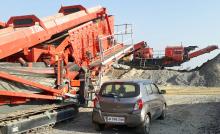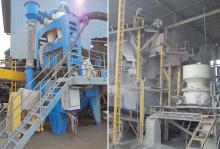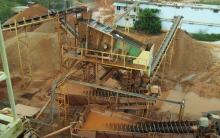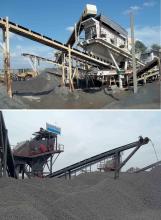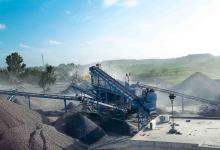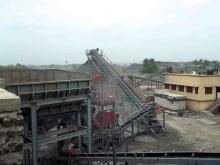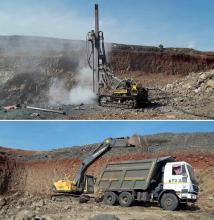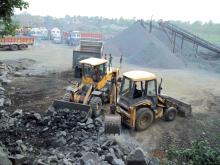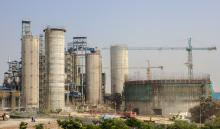JK Lakshmi Cement’s Udaipur Cement Works is a key site within the cement production hotbed of Rajasthan, North India. Partha Pratim Basistha visited the facility which is benefiting from fresh investment to meet India’s rising cement demand.
The picturesque North India state of Rajasthan is known for its rich medieval history. This is manifested in its architecturally stunning forts and palaces, as well as its beautiful lakes, making the area a global tourist attraction. However, beyond this, the state is recognised for its colossal reserves of limestone. This makes Rajasthan home to India’s major cement plants. Some of the major players are
The assured availability of high grade limestone ensures cement plant operators have economies of scale. However, given the very high level of competition in India’s cement sector, finding ways to maintain cement profitably is dominating the minds of business owners. These owners are also under increasing pressure from customers, facing ever tighter project completion dates, to ensure that they maintain a high level of clinker throughput for cement production.
Addressing these issues, cement producers in Rajasthan are making substantial capital investments in advanced technologies for the entire cement production value chain. One of the key areas of investment is in streamlining the sourcing of limestone from mines, and in its subsequent processing. JK Lakshmi Cement has been one of the major forerunners in this by investing in its Udaipur Cement Works, which produces the company’s premium ‘Platinum’ cement brand.
JK Lakshmi Cement is owned by Indian industrial conglomerate JK Group, which has business interests in tyre manufacturing (the company is one of the major producers of off highway tyres) and other commerce.
The installation of one Sandvik CJ815, 700tonnes/hour, primary jaw crusher and two Sandvik CS440, 350tonnes/hour cone crushers at the Udaipur Cement Works’ limestone crushing facility has been critical in future-proofing JK Lakshmi Cements’ ability to compete. The plant was sourced from Sandvik’s Swedish manufacturing facility.
The Sandvik CJ815 delivers 250mm crushed output. This is transported along 80m long conveyors for feeding the cone crushers, which deliver -60mm material. The crushed limestone is then transported along 6km of elevated conveyors to the cement plant for producing clinkers.
Speaking to Aggregates Business International, Deep Singh Charan, advisor (Crusher & MHE), Udaipur Cement Works, said: “The main objective towards installing the new plant was to enhance productivity and curtail operational costs. There were frequent breakdowns in the hammers of the earlier horizontal shaft impactors due to the very hard and abrasive character of the limestone here. This resulted towards higher down time and cost of maintenance, consequently contributing very high cost per tonne of crushed limestone output.”
Charan, a cement plant veteran, has been associated with JK Lakshmi’s Udaipur Cement Works’ limestone crushing facility since its inception in 1970.
He added: “Our prime requirement was that the crushing plant should have a stronger mantle and concave to allow us to crush the very hard rocks. Sandvik’s plant has very successfully exhibited this.”
With the given attributes, the downtime of Udaipur’s crushing plant has plummeted by 70%. Furthermore, the plant’s power consumption has fallen from 1000kW to 600kW. Thanks to their minimal downtime, Udaipur’s cement plants are now able to achieve required clinker output of 3750 tonnes/day, compared to 2,600tonnes/day previously.
Ever since the commissioning of the Sandvik plant, Udaipur Cement Works has successfully crushed five lakh tonnes (one lakh = one hundred thousand) of materials by running both plants 16 hours a day across two shifts without encountering any major issues.
“Sandvik India has assured us there would not be any major maintenance or parts replacement until 15 lakh tonnes of crushing [has been achieved] within the warranty period. However, seeing the high performance of the plant we are quite hopeful to achieve 30 lakh tonnes of production, or even beyond,” said Charan.
To optimise operation of the new Sandvik mineral processing plants, JK Lakshmi has invested in 14 Captain 2523, 6x4, Ashok Leyland rigid dump trucks. The trucks transport the limestone boulders 6kms from JK Lakshmi’s Garoli captive mines to the processing facility. Boulders are then fed to the grizzly feeders with one Hindustan wheeled loader. “The loader with its faster cycle time enables us to run the plant very efficiently,” said Charan.
Plant optimisation is also achieved through high levels of automation based on fully programmable logic controlled systems. CCTV monitors each area of plant operation for safety.
Along with advanced machineries for timely feeding and processing, the limestone crushing facility has a new Thermax bag dust collection system. The system efficiently collects dust at every emission outlet through its suction points. The dust collector recirculates the dust in the plant while fine air is passed through the chimney. The new dust collection system was installed to comply with the Rajasthan State government regulation for environmental protection and to avoid causing problems for nearby Udaipur Airport.

